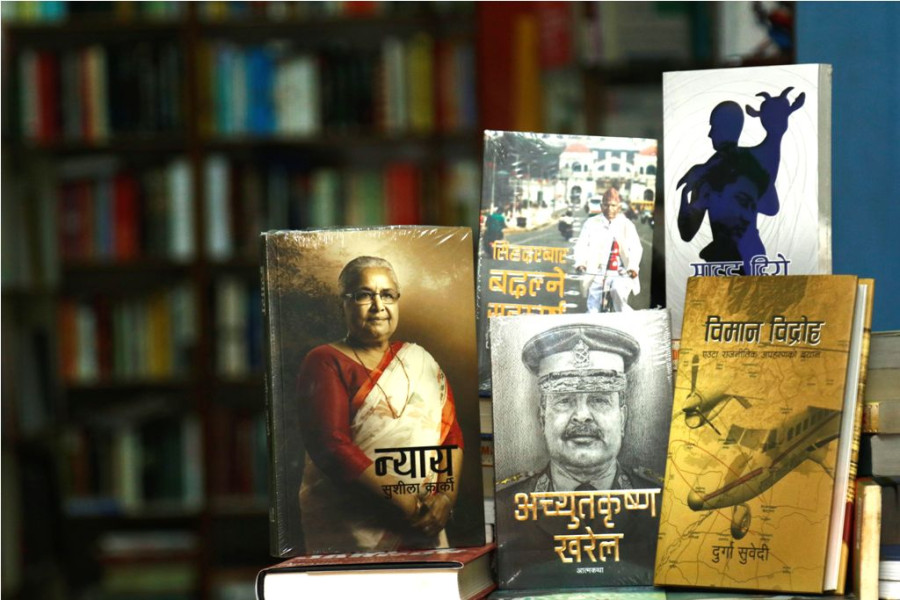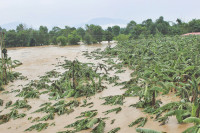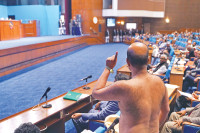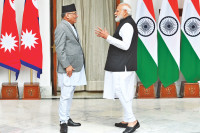Special Supplement
This is why autobiographies and memoirs sold more copies than other books
2018 saw a slew of biographies and memories, raising the question: why are we so interested in the lives of others?
Bibhu Luitel
Kitaab publishers, a publication house in Kathmandu, recently came out with two new books — Biman Bidroha: Euta Rajnitik Apaharan Bayan, an autobiography by freedom fighter Durga Subedi, and Aghori, an anthology of stories by Rajendra Parajuli. Both books sold well but it was the autobiography that did exceptionally well.
“From what I’ve seen, most readers are into Biman Bidroha,” says Kalpana Dhakal of Kitaab Publishers.
This isn’t something anomalous for the Nepali book market—most publication houses and distributors claim that biographies and memoirs sell more than any other genre. Public interest in learning about the lives of people who have left significant marks in history and society, whether in a good or bad way, has led this genre to flourish, say publishers. This kind of interest from readers has led many writers and non-writers to either pen their biographies and memoirs themselves, or employ ghostwriters to write on their behalf.
Just this year, Book Hill Publications, another publishing house, came out with two best-selling autobiographies—that of Sushila Karki, the former chief justice of the Supreme Court, and Captain Rameshwor Thapa, a rescue pilot known for conducting missions to the Far West of the country, especially during the decade-long Maoist insurgency. As of
writing, Book Hill also had plans to publish the autobiography of Swami Anand Arun of the Osho Tapoban by the end of this year. Furthermore, three or four memoirs from public figures are in the works for next year, including Parijat’s collection of letters she sent to her sister Sukanya Waiba.
“Our observation has shown that these genres sell more,” says Bhupendra Khadkam, co-founder and chairperson of Book Hill. “But that does not mean we will stop publishing books of other genres.”
Khadka started his publication house itself by publishing the memoirs of Pushkar Shah, entitled Sansarlai Sadhe Panch Fanko. In recent years, Book Hill has moved into publishing more and more memoirs and biographies, with the Ganga Maya Adhikari, who has been staging a fast-unto-death demanding action against those responsible for her son Krishna Prasad’s murder, and a memoir from fiction writer Kumar Nagarkoti.
Several other biographies came out in 2018 but did not gain as much publicity as the ones discussed above, however, they still managed to do well, say their publishers.
Kamal Dhakal, the chairperson of Ghost Writing Nepal, claims to have sold more than a 1,000 copies of gangster-turned-politician Nepaljit Lama’s autobiography, Manthan, on the very day it was launched and a total of 5,000 copies so far. He believes this comparatively large number for an independent publication is because of the subject’s large network of friends, family and acquaintances.
Ghost Writing Nepal, like its name suggests, consists of a group of writers who write and publish autobiographies on behalf of public figures. To date, the organisation has written and published Usha Nepal’s Pahilo Mahilaa CDO, Indra Bahadur Basnet’s Hidiyeko Goreto and Dharmaraj Regmi’s Mahaprasthan. Dhakal himself said he is working on Bhuwan KC’s autobiography, which will hit the Nepali market soon.
But why is it that autobiographies and memoirs sell more than other genres? “It’s the interest of the public,” Khadka says. It’s not just regular readers who buy such books, but also those who don’t really read other genres. The stature of the person being profiled appears to bring in even those who might not necessarily read books. “People long to go into detail about anything that happens in the life of a public figure,” says Khadka.
The impeachment motion against former Chief Justice Sushila Karki is something most people might know of, but what exactly was going through her head at that moment? What was her reaction to the media coverage, the mudslinging, the unnecessary attention? These are the kinds of details that cannot be found in any newspaper report and Khadka believes her autobiography sold so well precisely because readers wanted these minute details.
“It is a human nature to have an interest in the lives of others,” says psychologist Karuna Kunwar. Everyone is interested in what elevated some people to successful heights and what brought down previously successful people. They want to know if these famous and infamous people have similar lives, thoughts and feelings like they everyone else, says Kunwar.
In the age of social media and the celebrity, there are many opportunities for glimpses into the lives of the famous but these are fleeting; an autobiography affords a long hard and unmediated look into the private lives of others. And that is what attracts readers. “It is really no wonder that autobiographies and memoirs sell tremendously,” says Kunwar.




 9.25°C Kathmandu
9.25°C Kathmandu










